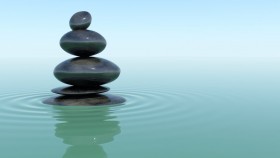Feed Your Soul
There are some things in life you take for granted: Your children will outlive you. No matter how tough it gets, you won't poison your spouse with arsenic-laced toothpaste. And if you have a best friend, you will attend her wedding.
But life sometimes upsets our most basic assumptions. And although I haven't resorted to the arsenic (yet), I did have this surprise: When my best friend from college got married, I wasn't there. Never in a million years did I think I would miss her wedding. We'd been talking about it since we were 18. And yet, when it came down to deciding about making the trip from California to New York, I did something radical, something I rarely do: I took my own needs into account.
I stepped away from my notions of what a good person would do, what any loyal friend would do, and considered the facts: I'd just returned from teaching an exhilarating but exhausting weeklong retreat; I had a broken ankle and a sprained back and could barely walk; my friend decided to get married rather suddenly and told me she wasn't expecting me to come. And I realized that although I would miss seeing her walk down the aisle if I didn't go, I would be a hobbling, exhausted wreck if I did. So I stayed home, sent champagne, and wrote my friend and her new husband a wedding story. It was an agonizing decision but not nearly as painful as the tale I told myself about it: If I don't go to my best friend's wedding — the very friend who held my hair back the night I drank a bottle of Cold Duck and threw up on the sidewalk — people will finally discover how selfish I am and I will lose every friend I have. I will spend my dying days alone, dribbling Diet Coke on my chin with no friends or family around. As soon as I realized I'd made a leap from taking care of myself to visions of dying alone, dribbling and friendless, I understood that I considered looking out for my own needs a radical concept — so radical that it scared me to (a pathetic, lonely, and potentially sticky) death.
I should know better. In working with tens of thousands of women over the last three decades, I've found that there is a whole set of beliefs called "the bad things that will happen if I take care of myself." I've heard things such as, "My son will choke on a fish bone the minute I leave him alone and take some time for myself." "My husband won't be able to make friends without me if I stay home from this party and rest." "My friend will hate me if I don't make brownies for her bake sale."
Think about this: Do you feel it is right to put yourself at the center of your own life, or is your secret fear that if you consider your own needs, you'll alienate the people you love and end up homeless, rifling through old chicken bones in a dark alley? Are you afraid that a "me first" attitude will get you drummed out of the "good people" club?
Most of us secretly believe that good people, especially women, take care of others first. They wait until everyone else has a plateful and then take what's left. Unfortunately, most of us make decisions based on our ideas of who we think we should be, not on who we actually are. The problem is, when we make choices based on an ideal image of ourselves — what a good friend would do, what a good mother would do, what a good wife would do — we end up having to take care of ourselves in another way.
Enter food. When you don't consider your real needs, you will likely fill the leftover emotional hunger with food. (Or another abused substance. Or shopping. But most of us opt for food.) You eat in secret. You eat treats whenever you can, because food is the one way, the only way, you nourish yourself. You eat on the run because you believe that you shouldn't take time for lunch; there's too much work to do. You eat the éclair, the doughnut, the cake, all the while knowing this isn't really taking care of yourself.
But to really take care of yourself, you have to think of yourself first.
"Is that possible?" you ask. "What about my children? I'd die for them." Have you ever considered why, on an airplane, the flight attendant tells you to put on your own oxygen mask first, before you help your children? It's because your kids' well-being depends on it. If you aren't grounded, present, calm, and able to breathe, there is no one to take care of them.
What would your life look like if you acknowledged the truth that working nonstop for 10 hours, taking care of other people, leaves you so spent and weary that there really isn't much left of you for your kids, let alone yourself? What would your life look like if you realized that you need to set aside time every day to fill yourself up — even if it's only by taking a few 15-minute breaks during which you stare at nothing or go outside or lie down? What would the pace of your life be if you went on "soul time" instead of clock time, even just a little?
It's possible. A few days ago, I spoke with a first-time mother. Her baby son had colic, and she was completely exhausted. She was so afraid she wouldn't be there when he needed her that she couldn't sleep even when he was napping or with her husband. And she was turning to food to calm herself down. I asked her what it would be like to do something very simple for herself: to sit down and breathe. That's all. No big deal. Nothing to achieve. Just let the body do what it was already doing and give herself a break. She said she could try that. She just breathed.
At the end of five minutes, I asked her how she felt. She said she was relieved, immediately calmer. She said that since she'd had her baby, she had forgotten all about herself and her needs, and while some of that was natural ("I'm so in love with him," she said; "I've never known love like this before"), she was not serving him best by exhausting herself. She said that caring for herself was doable — maybe not in the same ways she did before she was a mother, but in new ways. Taking small rests. Eating well. Going outside for even five minutes while he naps. "I can do this," she said. "I can treat myself with the same kind of care that I give him."
"Now you're talking," I said. "And the better you take care of yourself, the more he will know as he grows up that it's fine for him to take care of himself, too."
If you operate on what you believe a good mother/partner/friend would do and you leave yourself — what you need, how you feel — out of the equation, your relationships will suffer.
I'm here to tell you that cherishing yourself by making yourself a priority in your own life is possible. You can take care of your needs and your relationships with family and friends can thrive. I know, because I am making this my daily practice, and I am confident I will not go out either alone or dribbling.









